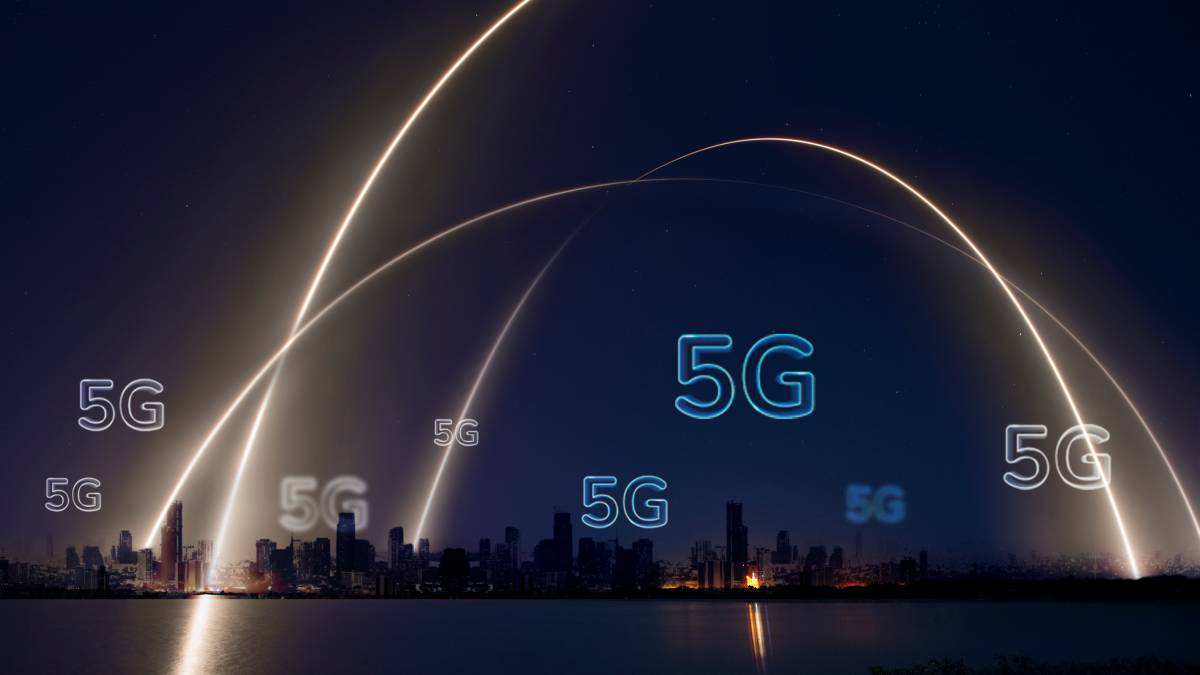5G technology is more than just an upgrade; it’s a seismic shift in how we connect, communicate, and conduct business. With download speeds up to 100 times faster than its predecessor, 4G, this groundbreaking advancement opens the door to innovative opportunities that small businesses have only dreamed of until now.

What sets 5G apart from earlier networks is its speed and capacity to support many devices simultaneously. This rich connectivity enables interactivity and responsiveness that traditional technologies can’t match. Small business owners can finally harness the full potential of advanced tools and applications, making their operations more efficient and customer experiences unparalleled.
Enhanced Connectivity
The leap from 4G to 5G technology brings a remarkable surge in speed and bandwidth capabilities, essential for modern small businesses aiming to thrive in a digital-first world. With download speeds potentially reaching up to 10 Gbps, the ability to transfer large files, conduct high-quality video conferences, or even stream events seamlessly becomes not just possible but commonplace. For instance, a graphic design startup can effortlessly send heavy design files to clients or collaborate on projects in real time without the dreaded lags or interruptions that could hinder productivity.
Moreover, 5G enhances communication channels between employees and customers, fostering an environment where collaboration can flourish. Imagine a retail management team accessing their inventory system from different locations concurrently while discussing strategy over a video call—this is now feasible thanks to ultra-low latency inherent in 5G networks. Small businesses can expect swift responses to customer queries through chatbots powered by artificial intelligence via instant messaging platforms and social media channels.
The shift towards remote work has also gained significant momentum due to the enhanced connectivity offered by 5G. Employees are no longer tethered to traditional office spaces; they can plug into their work environments from virtually anywhere—from cozy coffee shops to foreign cities—without sacrificing performance. For example, field technicians equipped with AR glasses can receive live assistance over video while diagnosing equipment issues on-site, drawing upon resources as if they were in the office. This flexibility increases employee satisfaction and broadens talent pools for small businesses looking beyond geographical limitations.
In essence, enhanced connectivity catalyzed by 5G does more than improve operational efficiency—it transforms how businesses engage internally and externally. By facilitating seamless communication and supporting remote work arrangements, small enterprises are better positioned to adapt swiftly to unpredictable market shifts while meeting the dynamic needs of their customers.
Empowering Mobile Workforces
The launch of 5G technology can fundamentally change how small businesses operate, particularly in empowering mobile workforces. With lightning-fast internet speeds and enhanced network reliability, the rise of mobile applications has become a game-changer for entrepreneurs. A boutique retailer can confidently use a mobile app to manage inventory seamlessly while attending an industry trade show—checking stock levels and ordering replenishments directly from their phone without missing a beat. The efficiency gains are clear; businesses can operate remotely more confidently, no longer tied down to physical locations.
Real-time data access is another critical benefit that comes with 5G. For example, consider real estate agents who depend on instant access to property listings and client information while out in the field. With 5 G’s capabilities, they can pull up high-definition videos and virtual tours within seconds, impressing clients and closing deals faster than ever before. This immediate availability of information allows employees to make informed decisions right when needed, streamlining operations and enhancing customer relations.
Furthermore, the boost in productivity through uninterrupted connectivity is significant. Small business teams equipped with the latest collaborative tools can carry out tasks from almost anywhere—whether it’s brainstorming sessions via video calls or pushing updates in team management software—all thanks to lightning-fast connections provided by 5G networks. Additionally, remote workers are afforded higher levels of flexibility while remaining fully integrated into company processes. This new era fosters happier employees who enjoy better work-life balance and significantly improved project outcomes for companies as a whole.
As small business owners embrace these advancements of 5G technology, they find themselves better prepared to compete in an increasingly dynamic marketplace. The ability to harness powerful mobile applications paired with real-time data access means that agility becomes a core strength for any business willing to adapt—and thrive—in this tech-savvy environment.
Transformative Customer Experiences
As 5G technology continues to transform the landscape of small business operations, one area where its impact is particularly profound is in customer experiences. Integrating augmented reality (AR) and virtual reality (VR) within retail environments creates engaging, immersive shopping experiences that captivate consumers. For instance, a furniture store can employ AR applications, allowing customers to visualize how a couch would look in their living room before purchasing. This streamlines decision-making and diminishes return rates, leading to heightened customer satisfaction and loyalty.
The instantaneous transaction speeds enabled by 5G redefine what it means to provide seamless service in today’s fast-paced market. Customers expect quick and efficient checkout processes—not only online but also in brick-and-mortar stores. With enhanced connectivity, small businesses can leverage mobile payment solutions that process transactions almost instantaneously, reducing wait times and preventing cart abandonment.
Additionally, personalization has emerged as a key driver in fostering meaningful customer relationships, and with 5G’s robust data capabilities, businesses can tap into deeper insights than ever before. With real-time analytics on consumer behaviors and preferences—powered by sophisticated IoT devices—small retailers can tailor promotions or product recommendations uniquely suited to each shopper’s taste. For instance, a boutique uses data from previous visits to alert returning customers about personalized discounts on items they frequently browse or similar styles that arrived in stock. Such adaptive strategies boost sales and significantly enrich the shopping experience.
In essence, 5G empowers small businesses to dramatically elevate their customer interactions. By embracing AR/VR technologies for engagement, ensuring speedy transactions for convenience, and leveraging powerful data insights for personalization, entrepreneurs can create remarkable experiences that resonate deeply with their clientele, setting them apart in an increasingly crowded marketplace.
Advanced Data Analytics
In the rapidly evolving landscape of small business operations, the integration of 5G technology with Internet of Things (IoT) devices creates a veritable treasure trove of data analytics opportunities. With advanced connectivity and speed, small businesses can leverage real-time data from various IoT devices to make informed decisions that enhance operational efficiency. For instance, a local grocery store equipped with smart shelves utilizing sensors can track inventory in real-time, sending alerts when stocks run low. This kind of immediate insight ensures that the store never runs out of popular items, ultimately improving customer satisfaction and boosting sales.
Moreover, real-time analytics empowered by 5G allows businesses to respond swiftly to fluctuating market conditions. Imagine a fashion retailer using predictive analytics tools powered by 5G connectivity to monitor social media trends as they unfold. By instantly analyzing customer sentiment and trending styles, the retailer can optimize their product offerings and adjust pricing strategies to capture emerging preferences. This agility enhances competitiveness and strengthens customer loyalty through timely alignment with consumer interests.
Another exciting application lies in predictive maintenance—an essential aspect for industries relying on equipment and machinery. Small manufacturing firms can utilize interconnected sensors placed on their machines throughout production lines to collect data continuously. When powered by 5G, these systems can analyze real-time performance metrics to predict when maintenance is needed before a breakdown occurs. If a machine is showing signs of distress or inefficiency, alerts can be automatically triggered for technicians to address issues proactively rather than reactively. This minimizes downtime and repair costs, allowing small businesses to focus on growth instead of unexpected disruptions.
As we embrace an era driven by advanced analytics facilitated by 5G connectivity, the potential for small businesses becomes more significant than ever before. By tapping into richer insights gleaned from their operations and customer interactions through IoT devices and real-time data analysis, entrepreneurs are empowered to adapt and thrive in an increasingly fast-paced commercial environment.
Cost Efficiency and Savings
As small businesses navigate an increasingly competitive landscape, the pressure to optimize operational costs becomes paramount. Enter 5G technology—a game-changer that drastically reduces expenses through enhanced efficiency. For instance, a local coffee shop that shifts to a 5G-enabled point-of-sale system can process transactions almost instantaneously, leading to shorter wait times and increased customer satisfaction. By integrating such swift technology into their operations, small businesses minimize the time spent on transactions and reduce the labor costs typically associated with slower systems.
Moreover, 5 G’s unparalleled speed fosters seamless communication among employees and smart devices within business ecosystems. Imagine a small construction firm equipped with IoT sensors reporting real-time data back to project managers—even while on-site—allowing for better resource allocation and quicker decision-making. With 5G enabling this kind of immediate feedback loop, businesses can streamline workflows significantly. This means fewer delays due to miscommunication or lack of information, ultimately trimming unnecessary costs from the budget.
Long-term financial benefits also become visible when investing in 5G infrastructure. Businesses that adopt advanced technologies early stand to capitalize on new market opportunities by providing superior services at competitive prices. Consider a fitness studio implementing virtual classes streamed via 5G networks; reaching wider audiences without needing additional physical space or resources could see substantial returns on their initial tech investment. While upfront costs may seem daunting, the strategic shift towards adopting this cutting-edge network will lead to sustainable savings and improved profitability over time.
In essence, the transition to 5G is more than just an upgrade—it’s an investment that redefines how small businesses operate financially. As entrepreneurs embrace this next generation of connectivity, they’re not just enhancing performance today but laying the foundation for future growth through more intelligent resource management and cost-effectiveness that resonates across all operations.
Security Improvements with 5G
As small businesses become increasingly reliant on digital operations and online interactions, security remains a paramount concern. The advent of 5G technology brings innovative cybersecurity measures that significantly bolster defenses against potential threats. Unlike previous generations, the high-speed and ultra-reliable connectivity of 5G enables businesses to implement robust encryption protocols and multifactor authentication systems quickly, ensuring that sensitive data is protected from cybercriminals. For instance, retailers using 5G can encrypt customer payment information seamlessly at lightning-fast speeds during transactions, mitigating the risk of data breaches.
In addition to enhanced security measures, 5G introduces real-time monitoring capabilities that empower small businesses to identify and respond to threats instantly. With the Internet of Things (IoT) devices becoming more prevalent in business operations—ranging from smart cameras to connected POS systems—venues can leverage the speed of 5G to monitor network activity continually. Consider a restaurant utilizing IoT-enabled kitchen appliances; with 5 G’s rapid connectivity, if there’s an unusual spike in device communication that may indicate a security breach, alarms can be triggered immediately, allowing for swift intervention while protecting both operational integrity and customer trust.
Trust is invaluable in today’s marketplace. As consumers grow increasingly aware of privacy issues and data protection laws like GDPR or CCPA, the ability of a business to communicate its commitment to security becomes essential for attracting and retaining customers. Small companies can instill confidence in their clientele by integrating improved security protocols enabled by 5G technology into their operations—such as secure customer portals or blockchain applications for transparent transactions. This ultimately enhances brand loyalty and positions these enterprises favorably in competitive markets where consumer trust is often built on perceived safety.
With these advancements offering robust defense mechanisms paired with capable real-time monitoring and communication strategies rooted in transparency, small businesses are not just surviving but thriving in an ever-evolving threat landscape. Embracing 5G means embracing a future defined by improved security resilience that markedly reassures business owners and their customers.
Future Trends for Small Businesses in a 5G World
As we venture further into the era of 5G technology, small businesses can expect a wave of transformative trends that will redefine their operations and customer interactions. One significant advancement is the increasing integration of artificial intelligence (AI) with machine learning technologies. With enhanced connectivity and data transfer speeds, AI can analyze vast amounts of information in real time, allowing businesses to predict consumer behavior and automate personalized marketing strategies. For instance, imagine a boutique that utilizes AI to send tailored promotions directly to customers’ smartphones based on their past purchases and browsing history while they’re nearby—the synergy between real-time data processing and 5G capabilities opens up possibilities like never before.
Moreover, businesses can anticipate significant shifts in customer behavior facilitated by tech integration. As augmented reality (AR) applications become more accessible via 5G networks, brands will be able to offer immersive shopping experiences that bridge the gap between physical stores and online shopping. A furniture retailer might allow customers to visualize how a new sofa looks in their own living room through an AR app using 5 G’s low latency technology—this kind of innovation not only enhances engagement but also builds more substantial connections with the brand. As consumers increasingly lean toward experiences over mere transactions, those who effectively harness such technologies will see a surge in loyalty and repeat business.
To stay ahead in this fast-evolving landscape, small businesses must adopt proactive strategies tailored for a 5G world. One approach is investing in ongoing employee training programs that emphasize digital skills and technological fluency across all levels of staff. Cultivating a culture of experimentation allows employees to explore new tools and techniques without the fear of failure—this mindset can lead to improved team agility and more innovative solutions to customer needs. Additionally, leveraging strategic partnerships with tech providers ensures continuous access to cutting-edge resources while minimizing implementation challenges down the line.
In conclusion, embracing these future trends driven by 5G is essential for small businesses aiming to survive and thrive amidst rapid change. By exploring advanced AI capabilities, refining customer interactions through AR technology, and developing agile teams ready for innovation, entrepreneurs can position themselves at the forefront of their industries while meeting evolving consumer demands head-on. The opportunity to leverage these advancements could mean the difference between leading the pack or being left behind as technology continues its relentless march forward.
Overcoming Challenges During Transition
Transitioning to 5G technology presents several challenges for small businesses, many of which stem from the complexities associated with upgrading infrastructure and processes. One common hurdle is the cost of accessing 5G services. Small enterprises often operate on tight budgets, making the initial investment in new hardware, software, and network capabilities daunting. Additionally, there can be resistance among employees who are accustomed to traditional workflows; they may hesitate to embrace new technologies due to fear or uncertainty about how they will impact their daily tasks.
To smoothly integrate 5G into existing operations, small business owners need a clear plan that outlines specific objectives for the transition. Implementing pilot programs can be particularly effective; testing out 5G applications on a smaller scale allows businesses to identify potential issues before a full rollout. For instance, a retail store might trial mobile point-of-sale solutions powered by 5G in one location to assess speed and customer satisfaction. Moreover, partnering with experienced technology consultants can aid in creating a custom strategy tailored to each business’s unique needs and infrastructure.
One critical aspect of overcoming these challenges is investing in employee training and fostering an adaptive company culture. As new tools enter the workplace, it’s vital to equip employees with knowledge and skills through workshops or ongoing training sessions focused on utilizing 5G technologies effectively. Empowered employees are more likely to see change as an opportunity rather than an obstacle, leading to higher productivity and overall organizational morale. By clearly communicating the benefits of adopting advanced solutions, such as improved efficiency or increased market competitiveness, leadership can cultivate enthusiasm around transforming processes instead of pushing back against them.
While transitioning to 5G may initially seem overwhelming for small businesses, thoughtful strategies combined with robust internal support systems can facilitate this technological evolution. A proactive approach addresses immediate concerns and sets firms up for long-term success well into the 5G era and beyond.
Embrace the Future with 5G
As we’ve explored, 5G technology is nothing short of a game-changer for small businesses. Its revolutionary speed and capacity empower owners to connect better, analyze real-time data, and create exceptional customer experiences. The benefits extend far beyond the technical; they foster innovation and adaptability in an ever-evolving market.
Now is the time for entrepreneurs to embrace this transformative potential. By leveraging 5G capabilities, small businesses can streamline operations and enhance their services in ways previously thought impossible. Don’t let hesitation hold your business back. Leap into the future of connectivity and make 5G work for you!




